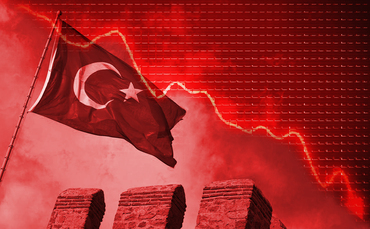
Erdogan, who will be sworn in on 3 June, has overseen a shift towards a more authoritarian style of government since his first election in 2014.
Ninety One analyst Roger Mark described the president’s biggest challenge as Turkey’s economy, pointing to the backdrop of “perilous economic imbalances”.
Turkey has been pushed towards 44% inflation through Erdogan’s determination to keep interest rates low, feuding with the country’s central bank and firing two of its deputy governors in 2021.
Meanwhile, the country’s employment rate is the lowest of the OECD’s 38 countries at 53%, while the Turkish lira has reached a record low against the dollar.
Market reaction
Matthias Siller, co-manager of the Barings Emerging EMEA Opportunities trust, said markets had initially reacted negatively when it became apparent Erdogan would secure another term.
“This was best exemplified by the substantial rise in Turkey sovereign credit default swaps immediately after the first round of elections, in our view closely correlated to the country specific equity risk premium,” he said.
Mohammed Elmi, senior portfolio manager, emerging markets fixed income at Federated Hermes, added markets had “already largely priced in Erdogan’s win after his strong first round performance”.
The first round of voting, held earlier last month, saw Erdogan come close to winning a majority of the votes in a surprise surge.
By contrast, the market bounce after Erdogan’s win in the second round on the weekend can be attributed to rumours of change in the economic team and a return to monetary orthodoxy, Siller said.
Elmi said Mehmet Simsek, former deputy prime minister and minister of finance, had been rumoured to be entering the new cabinet, leaving markets hopeful “he could instigate much needed economic orthodoxy and engage with the market more effectively”.
Hakan Aksoy, senior portfolio manager, emerging market debt at Amundi, agreed, arguing the market was expecting a policy shift “from unorthodox to orthodox” following the election.
He noted the Turkish stock market had risen by 11% in the last week, with Turkish credit default swaps tightening around 100 basis points.
“After President Erdogan is sworn in this week, he will announce his cabinet and we will have a better understanding of the Turkish economy’s roadmap. However, we are optimistic for a policy shift going forward,” Aksoy said.
Omotunde Lawal, head of emerging market corporate debt at Barings, added that following the election, the government seemed to be allowing some FX adjustment, further reassuring markets.
However, Lawal said: “Given his choice of unorthodox policies over his last two decades in power, it is hard to see him implementing any material changes.”
She explained the opposition had been expected to tackle inflation through high interest rates and greater FX flexibility, but Erdogan seemed poised to continue with current policies.
“We are watching if there will be any changes to his policies ahead of the municipal elections, which are scheduled for March 2024, but Erdogan in his balcony speech over the weekend did reiterate his desire to keep interest rates low,” she added.
Currency
FX reserve depletion of about $25bn in two months has left the central bank with “limited liquid FX reserves”, according to Ninety One’s Mark, who argued that “currency depreciation seems inevitable”.
Mark singled out the country’s large current account deficit as a key factor of this, with many one-off sources of income starting to dry up, such as Russian investment in nuclear power plant construction.
Lawal agreed, adding that given the “extremely low reserves level” to increase investment in the country the government must seek to rebuild its foreign currency reserves.
She suggested measures including increased directives to repatriate FX cash for exporters, retrospective tax bills, or even asset appropriation.
“From a fixed income perspective, it has been hard to be optimistic on Turkish risk assets, especially corporates, without a solid sovereign anchor,” added Lawal.
However, if the country can overcome these currency issues, Siller said Turkey was “brimming with potential”, and pointed to the deep liquidity of its stock market, with “many well-run companies boasting solid balance sheets”.
Valuation was also strong in the market, while its export sector continues to perform strongly, he added.
“The key to unlocking this potential lies in rebuilding trust in the government’s economic policy and overall governance, which will take more than just gestures and requires building a track record of sound economic decision making under the helm of an independent, experienced team in the Treasury and the central bank,” Siller said.



